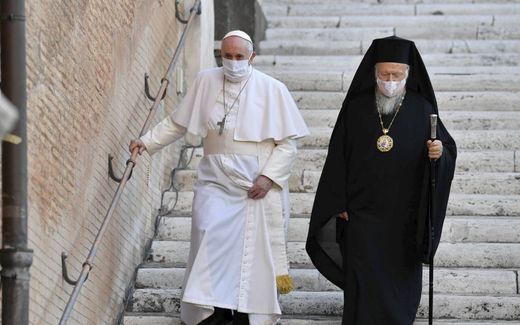Green leader in Germany accused of plagiarism in book

Green's leader Annalena Baerbock has to do with allegations of plagiarism in her new book. Photo EPA, Andreas Gora
Central Europe
The new German Green leader Annalene Baerbock is accused of plagiarism. In her new book “Jetzt: wie wir unser Land erneuern” (Now: how we renew our land), there would be at least ten passages that have been copied from other sources without mentioning.
The Neue Zürcher Zeitung reports that based on research done by media scientist Stefan Weber from Salzburg in Austria.
Annalena Baerbock was selected as the first chancellor’s candidate of the German Green Party in April this year. She shares the party leadership with Robert Habeck.
Shortly after her appointment, she published her book in June, in the run-up to the general elections in September. The publisher claims Baerbock herself is the book’s author, although she worked from scripts written by somebody else.
Sloppiness and amateurism
Weber found an example of plagiarism in a passage about climate change. That piece of text would rest upon the article “Kriegstreiber Klimawandel” by the American Michael T. Klare from 2019 in the German magazine “Internationale Politik”. Baerbock doesn’t refer to Klare’s article.
Other passages came from blogs or texts from Wikipedia of the German weekly Der Spiegel but without mentioning the source, according to Weber in the Neue Zürcher Zeitung. He speaks about “sloppiness and amateurism”.
He doesn’t understand that nor the author nor the publisher have been more critical on this. Plagiarism has had an enormous impact on German politics over the last ten years, starting with the scandal around Defence Minister Karl-Theodor von und zu Guttenberg in 2011. He would have plagiarised large parts of his PhD thesis. After Guttenberg, several leading German politicians had to resign for plagiarism in the PhD thesis or other publications. Other politicians –among others Dr Ursula von der Leyen, the President of the European Commission– survived a storm about this.
Weber doesn’t understand why the publishing house Ullstein-Verlag has not been more critical of Baerbock’s book. Even for non-scientific authors, it would be “unethical” to copy so much text. Although such a book is not a PhD thesis, Weber says. Many publishers have a clause about plagiarism in the author’s contract, according to Weber.
Party speaks about defamation
Ullstein-Verlag said to the Neue Zürcher that the manuscript had been read “carefully”. The description of common knowledge facts does not have such robust copyright protection as other texts, the publisher says. For that reason, the publisher didn’t find copyright problems.
A spokesperson of the Green Party speaks about “defamation”. “We firmly reject the allegation of copyright infringement.”
Baerbock’s lawyer, Christian Schertz, refers to facts that are part of common knowledge: “The few passages referred to are nothing more than the reproduction of generally known facts and political views.” Just as news is not subject to copyright protection, this also applies to historical facts or generally known findings connected with ecology and the environment. The accusation is therefore unfounded, according to Mr Schertz.
Baerbock was elected as party leader in April. She started as a promising candidate but has been in heavy weather since. First, there was an affair about secret payments from her party. Secondly, there were mistakes in her cv. And now there are accusations about plagiarism in her book. The chancellor’s candidate precisely wrote this book to present herself to the voter better.
Weber has also asked the London School of Economics for Baerbock’s Master thesis about international law from 2005. So far, the British university has not given that text.
Related Articles






